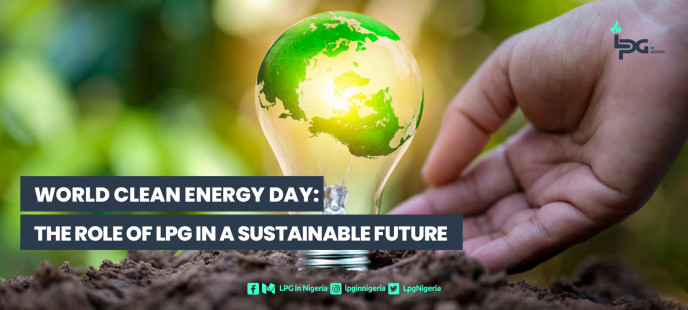- 3065
- 0
Sharing Ideas and Updates on LPG in Nigeria and related information to enable effective collaboration within the LPG Value Chain
World Clean Energy Day: The Role Of LPG In A Sustainable Future

Each year, World Clean Energy Day serves as a global reminder of the urgent need to transition toward cleaner, more sustainable energy sources. It’s a day to reflect on the strides made in reducing carbon footprints and to spotlight innovative energy solutions that hold the promise of a greener future. Among these solutions, liquefied petroleum gas (LPG) stands out as a key player in bridging the gap between traditional fuels and renewable energy sources. In the context of Nigeria and many other developing economies, LPG has emerged as a transformative energy solution, offering both environmental and socioeconomic benefits.
LPG in Nigeria: Championing Clean Energy Advocacy
At LPG in Nigeria, we are proud to be part of the movement driving cleaner energy adoption in the country. As a leading voice in the LPG industry, we remain committed to educating communities, supporting government initiatives, and fostering partnerships that prioritize sustainability and safety. This World Clean Energy Day, let’s reaffirm our commitment to creating a future powered by cleaner, more sustainable energy. Together, we can reduce emissions, protect our environment, and improve the quality of life for all Nigerians.
LPG: A Cleaner Energy Option for the Present
LPG is a low-carbon energy source composed primarily of propane and butane. Unlike traditional biomass fuels such as firewood and charcoal, LPG burns cleanly, producing significantly lower levels of carbon dioxide (CO₂), particulate matter, and other harmful emissions. This makes it a viable alternative for cooking, heating, and powering small-scale industries in regions heavily reliant on polluting energy sources.
Environmental Impact
Reduced Deforestation: In Nigeria, widespread use of firewood for cooking contributes to deforestation, a leading cause of biodiversity loss and soil degradation. Switching to LPG alleviates the pressure on forests while ensuring households have access to efficient cooking fuel.
Lower Emissions: LPG emits about 50% less CO₂ compared to coal and significantly less particulate matter than wood or kerosene. Its adoption supports Nigeria’s commitment to achieving the goals outlined in the Paris Agreement and the Nigerian Energy Transition Plan.
Energy Accessibility
With ongoing government efforts to enhance LPG infrastructure, more Nigerians, especially in rural and underserved areas, are gaining access to affordable and reliable energy. This aligns with UN Sustainable Development Goal 7: Ensuring access to affordable, reliable, sustainable, and modern energy for all.
LPG’s Role in Achieving a Clean Energy Future
Bridging the Gap Between Fossil Fuels and Renewables
While renewable energy sources such as solar and wind are the ultimate goal, transitioning to them at scale requires significant infrastructure investments and time. LPG serves as an efficient transition fuel, offering immediate reductions in greenhouse gas emissions without requiring the massive infrastructure overhaul demanded by renewables.
Improved Health Outcomes
Switching from biomass fuels to LPG can drastically improve indoor air quality, reducing respiratory illnesses caused by exposure to smoke. According to the World Health Organization (WHO), household air pollution is a leading cause of premature deaths in low- and middle-income countries. By promoting LPG adoption, Nigeria can significantly reduce health risks for millions of its citizens.
Economic Opportunities
The growth of the LPG industry creates jobs across the value chain—from manufacturing and distribution to retail and maintenance. Additionally, government initiatives such as the National LPG Expansion Plan have opened up opportunities for small businesses, including LPG refilling stations and cylinder distribution networks.
Nigeria’s Commitment to Clean Energy Transition
As Africa’s largest economy and second-largest LPG producer, Nigeria has taken significant steps to position LPG as a cornerstone of its clean energy strategy. Initiatives such as the Nigerian Gas Expansion Programme (NGEP) and the push for local manufacturing of LPG cylinders demonstrate the government’s commitment to reducing reliance on polluting fuels while making cleaner energy accessible to all Nigerians.
Moreover, Nigeria’s leadership role in promoting LPG adoption across West Africa amplifies its influence in achieving the 2030 Clean Cooking Goals, which aim to reduce biomass dependency across the continent.
How to Celebrate World Clean Energy Day with LPG
Educate and Advocate: Use this day to raise awareness about the environmental and health benefits of LPG. Share resources and host discussions on how LPG adoption can drive sustainable development in Nigeria.
Support Local Initiatives: Engage with government and private sector efforts to promote LPG accessibility, such as the distribution of subsidized cylinders or the establishment of rural refilling stations.
Invest in Cleaner Cooking: For households still using firewood, kerosene, or coal, World Clean Energy Day is a perfect opportunity to make the switch to LPG.
Community Outreach: Organize workshops or demonstrations to teach safe handling, storage, and usage of LPG, especially in rural areas where awareness is low.
The Future is Clean, and LPG is Leading the Way
As the world moves toward a sustainable energy future, LPG remains a critical player in balancing immediate energy needs with long-term environmental goals. On this World Clean Energy Day, let’s celebrate the progress made and continue working towards a cleaner, healthier, and more prosperous Nigeria.
















0 Comment.